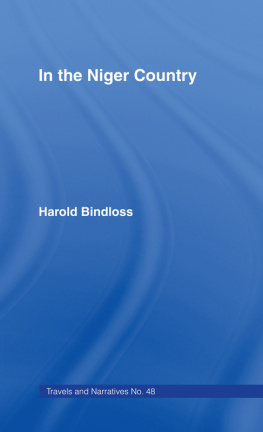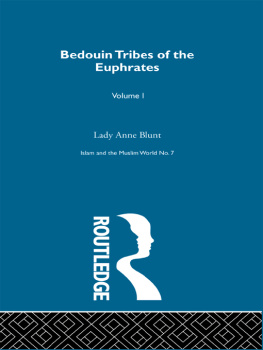This impression first published by
FRANK CASS AND COMPANY LIMITED
This edition published by Routledge - 2012
2 Park Square, Milton Park, Abingdon, Oxon, OX14 4RN
711 Third Avenue, New York, NY 10017
Routledge is an imprint of the Taylor & Francis Group, an informa business
HAROLD BINDLOSS
In the Niger Country
| First edition | 1898 |
| New impression | 1968 |
JAMES PINNOCK
Benin
| First edition | 1897 |
| New impression | 1968 |
Transferred to Digital Printing 2006
ISBN: 978-0-714-61791-6 (hbk)
ISBN: 978-1-136-25369-0 (ebk)
Publishers Note
The publisher has gone to great lengths to ensure the quality of this reprint but points out that some imperfections in the original may be apparent
IN THE NIGER COUNTRY
CONTENTS.
General characteristics of the Niger region and its inhabitantsThe fever beltMoslem influenceThe SaharaEarly eastern explorersThe advent of the EuropeanMungo Park, his forerunners and successors
Santa Cruz, TeneriffeRepulse of NelsonN.E. tradesYoung factory assistantsFreetown, Sierra LeoneInfluence of missionariesTypes of population
Emir SamaduKonno and Sofa raidersMarch of the West IndiasAttack on WeimaFatal mistakeDefeat of the raiders
A tornadoMonroviaThe black republicKroo labourersKroo villagesMeans of transportWant of harbours
Early settlementsFantis and ShantisHaussa constabularyElmina and Cape Coast Castle, AccraAfrican surfThe French in Dahomey
Lagos roads and townColour-casteTrade of Lagos, and its barFirst glimpse of Niger deltaCrossing the barEarly traders and establishment of Royal Niger Company
General aspect of AkassaSalt and ginArab tradersEuropean dwellingThe Chartered Company
The Nimbi tribeCause of hostilitiesAttack on the factoryMurder of KrooboysUnexpected helpCannibalismDestruction of Nimbi
African bushNative villageDown an African streamThe mantle of AnaniasSunday evening on the Niger
Lower reachesFrench policyMoslem industriesTimbuktuThe SaharaTurning back of trading expeditionsRise and fall of SonghayThe advent of the FulahEmir Othman and the rise of Sokoto
Commercial importance of this water-wayA negro pilotTragic story of French survey vesselForcados post-officeHer Majestys mail on the NigerPropitiating the powers of darkness
Mangrove swampsCharacteristic accidentRamming the forestTrade canoesWarri and its ConsulateHow justice is administered on the NigerMajor Crawford
Yoruba troopsPalm-oilHow the trading agents liveImportation of fire-armsInfluence of the forestEnd of Major CrawfordRed tape
Heathen mythologyThe Ju-JuSuperstitious white tradersThe first of the slave tradeBristol and LiverpoolPalm-oil ruffiansDomestic slavery
Benin riverNew BeninThe building of a factoryYoung trading clerksThe man who struck
Seamen tradersA Niger headmanThe Consulate and Government policyOld BeninFetiche treasureEarly Latin explorersUnfortunate expeditionCharacteristic episodeA few climatic evils
The evolution of a bush potentateHow Nana defied the GovernmentSapelli palaverThe impregnable stockadeFutile attack on BrohemieDestruction of BrohemieNanas expiation
MosquitoesEarly morning in a Niger factorySilk hat and gun-caseGeneral aspect of SapelliHow trade is carried onThe fascination of the forestThe ways of the bush tradersAggri beads
Government headquartersThe banks of an African riverThe power of the Ju-JuThe home of the feverIn chase of an alligatorJacks diversions ashore
An unsuccessful ventureA refractory oil-launchThe police of the seas
The last journeyEnglishmen in the tropicsA faithful ministerThe ways of the feverAn incident at sea
Why some missionaries failTrading preachersThe power of faithThe JesuitsModern martyrsNeed of medical skillMissionary women
Bonny barNative squalorHow the Opobo men kept their gunsBeneficent missionary influenceThe black mans bishop
The Protectorate of Sierra LeoneSource of the NigerNative racesMoslem conquestNorthwards from the deltaOnitsha slave marketLokoja campOur black soldiers
The seaboard negroHow the bush trader beginsNegro method of dealing with competitionChopping oil, a new method of collecting accountsProducts of the Niger basin
Expansion of the rubber tradeRapid development of West African commerceA rubber forestHow rubber is gatheredDevious ways of native tradersA field for the adventurerHow Johnson searched for rubber
Hauling out from WarriGood-byeVanquished by malariaFunerals at seaTraining of EnglishmenA necessary sacrificeWhat we look for.
MAPS
Niger Delta
In the Niger Country.
Chapter I.
In Early Days.
BETWEEN two lines drawn roughly north and south from Sierra Leone to Bojador, and the Bight of Biafra to Fezzan, there lies a vast quadrangular tract of northern Africa, through the heart of which the Niger flows. The story of this region is more or less bound up with that of the great river, for throughout the greater portion of a thousand years rumours of the fertility and wealth of the Niger basin led adventurous explorers, first from the ancient East and then from the young West, onwards into the wilds of the Sudan. Many races, differing widely in origin, character, and mode of life, dwell there, and for the clearer understanding of its aspect and history it may be divided into three zones.
Starting at a point some two hundred miles from the mouth of the Gambia, a line running approximately parallel to the sweep of surf-fringed beach as far as Lokoja on the Lower Niger would enclose what may be termed the coastwise strip. This is the tract with which Europeans are best acquainted, though even now, after trading there for four hundred years, portions of it still lie beyond their knowledge. It is a land of heat and steam, dense forests of cotton-trees and oil-palms, muddy rivers and wastes of quaking swamp. The shadow of the pestilence hangs heavily above it, and throughout the greater portion Ju-Ju superstition reigns supreme. White men suffer many climatic ills, or die by scores of malarial fever, while the native tribes are decimated by infectious sicknesses. Its inhabitants are generally of pure negro type, and, with the exception of Sierra Leone, Liberia, the Gold Coast, and Lagos, where some have been civilised with a vengeance, are for the most part degraded savages, worshippers of devils, and participators in horrible fetiche rites. There are exceptions; but, generally speaking, the classification holds good, for contact with Europeans has done little after all to change the character of its swarming peoples, neither has Christianity touched more than the fringe of this mass of dark humanity.










